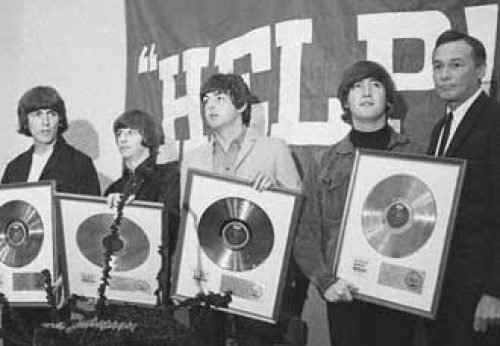The Beatles, a band that would come to define a generation, began its journey in Liverpool, England, in 1960. The founding members, John Lennon, Paul McCartney, and George Harrison, were joined later by Ringo Starr in 1962, solidifying the quartet that would gain worldwide fame. The roots of the group traced back to the late 1950s when Lennon formed a skiffle group called the Quarrymen. McCartney joined in 1957, followed by Harrison in 1958. The band went through several name changes—from Johnny and the Moondogs to the Silver Beetles, and finally to The Beatles in 1960.
Early Signs of Success
The Beatles’ early days were characterized by relentless performing, primarily in Liverpool and Hamburg, Germany. Their stints in Hamburg were particularly formative, honing their performance skills and building their stamina. The young band played in clubs such as the Indra, the Kaiserkeller, and the Star-Club, often performing for hours on end. These grueling sessions were instrumental in shaping their musical cohesion and stage presence.
Their return to Liverpool saw them becoming fixtures at the Cavern Club, where they quickly built a loyal following. The Beatles’ increasing popularity in Liverpool was marked by growing attendance at their performances, driven by their charismatic stage presence and a growing repertoire of covers and original songs.
Breakthrough with Local Recognition
The pivotal year for The Beatles was 1962 when they auditioned for Decca Records, famously being rejected with the critique that “guitar groups are on the way out.” However, resilience led them to a successful audition for George Martin at Parlophone Records, who agreed to sign them. Later that year, they released their first single, “Love Me Do,” which managed to break into the British charts, peaking at number 17. This initial success was a significant breakthrough, laying the groundwork for their explosive rise to fame.
The Beatles’ early achievements were not just a prelude to their later global success but were crucial in establishing their confidence and style. This period was marked by significant musical experimentation and the development of the songwriting partnership between Lennon and McCartney that would yield some of the most memorable songs in music history.
Breakthrough and Rising Popularity
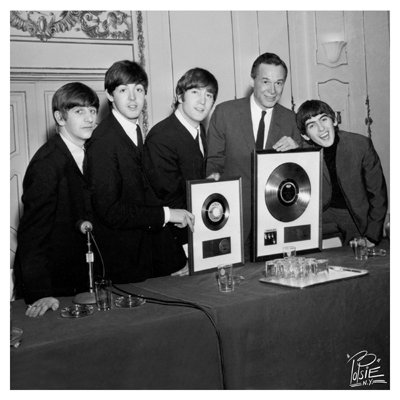
The Beatles’ real breakthrough came with the release of their second single, “Please Please Me,” in early 1963. Unlike its predecessor, this single was an immediate hit, reaching number one on several UK charts, although officially it peaked at number two on the most widely recognized chart at the time. This success ushered in what would famously become known as “Beatlemania“—a phenomenon characterized by intense fan frenzy and widespread popularity.
Key Albums and Songs That Defined an Era
The release of their debut album, also titled Please Please Me, in March 1963, solidified their status as a leading force in music. Recorded in a single day, the album was a mix of original songs and covers, showcasing the band’s raw energy and harmony. It topped the UK charts for an astonishing 30 weeks, only to be displaced by their subsequent album, With The Beatles. This album featured hits like “All My Loving” and “She Loves You,” the latter becoming the best-selling single of the 1960s in the UK.
1964 marked their explosive entry into the American market with the iconic appearance on “The Ed Sullivan Show,” watched by an estimated 73 million viewers—a record at the time. Their performances of “I Want to Hold Your Hand” and other hits ignited the British Invasion of the US music scene. Following this, A Hard Day’s Night and Help! were not only successful albums but also motion pictures that expanded their appeal and showcased their charismatic personas.
Awards and Recognitions
During this explosive phase of their career, The Beatles began accumulating numerous accolades. In 1964, they received their first Grammy Awards nominations, notably winning Best New Artist and Best Performance by a Vocal Group for “A Hard Day’s Night.” The same year, they also won five Ivor Novello Awards, which celebrate songwriting and composing merits. Their song “She Loves You” earned them the prestigious award for The ‘A’ Side of the Record Issued in 1963 with the Highest Certified British Sales, signifying its massive appeal.
Their soaring popularity and critical acclaim during these years not only marked a monumental phase in their career trajectory but also reshaped the music industry, setting new standards for success and fandom in popular music.
Innovations and Cultural Impact

The Beatles were not just musical icons; they were pioneers who continually pushed the boundaries of music production, songwriting, and album artistry. Their innovative use of the studio as an instrument began to be prominently evident with the album Rubber Soul (1965), where they experimented with new sounds and textures, including the use of the sitar on “Norwegian Wood.” This experimentation continued with Revolver (1966), where they incorporated tape loops, backward recordings, and advanced production techniques in songs like “Tomorrow Never Knows.”
Perhaps the apex of their experimental phase was Sgt. Pepper’s Lonely Hearts Club Band (1967), a concept album that revolutionized the music industry with its cohesive narrative, intricate arrangements, and pioneering cover art. This album not only influenced the way music was recorded but also how it was perceived as an art form, encouraging other artists to experiment more freely with their musical ideas.
Influence on Music and Global Culture
The Beatles’ influence extended far beyond the confines of music; they became cultural icons whose impact was felt in fashion, film, and social attitudes. The “mop-top” haircuts and Edwardian suits initially worn by the band set fashion trends that defined the 1960s. Musically, their willingness to incorporate diverse influences—from classical and Indian music to psychedelic rock—opened up new avenues for global music interactions and helped popularize non-Western musical forms in the West.
Their lyrics often reflected the social and political changes of the era. Songs like “Revolution” and “All You Need is Love” became anthems for the peace movement and the counterculture of the 1960s. Their public statements, such as John Lennon’s controversial remark that the band was “more popular than Jesus,” sparked intense debate and reflected their influence over public opinion and cultural trends.
Awards and Recognition of Cultural Impact
The Beatles’ cultural impact was recognized with numerous awards and accolades throughout their career and beyond. Sgt. Pepper’s Lonely Hearts Club Band won four Grammy Awards in 1968, including Album of the Year, making it one of the first rock albums to receive this honor. The album’s cover also won a Grammy for Best Album Cover, Graphic Arts, highlighting its influence on the visual side of music marketing and album presentation.
In addition to musical awards, The Beatles were appointed Members of the Order of the British Empire (MBE) in 1965, a significant honor reflecting their contribution to British culture and the global influence they had achieved at that time. Later, their continued relevance and influence were solidified when they were inducted into the Rock and Roll Hall of Fame in 1988, further cementing their legacy as one of the most influential musical acts in history.
Record-Breaking Hits
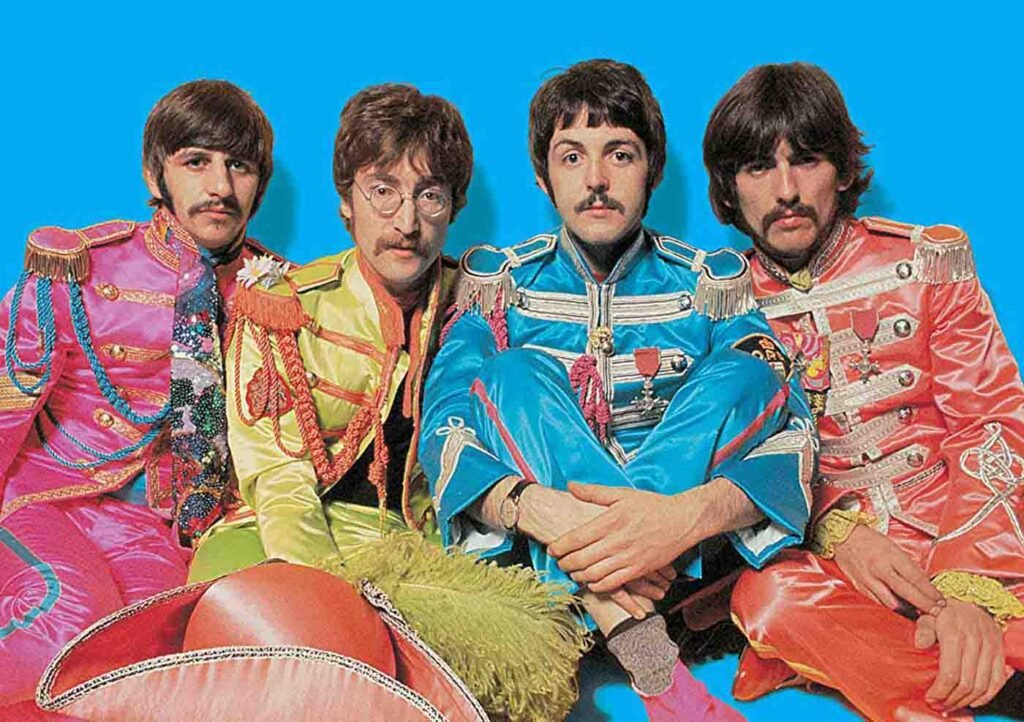
The Beatles’ catalogue is studded with hits that not only topped the charts but also set records that stand as testaments to their enduring popularity and commercial success. Perhaps no single better illustrates their early chart dominance than “I Want to Hold Your Hand.” Released in 1963, it became their first US number one hit, selling over 12 million copies worldwide. This track spearheaded the British Invasion of the American music charts, marking a pivotal moment in rock and roll history.
Their 1964 hit “Can’t Buy Me Love” stormed the US charts by making a record-breaking leap from position 27 to number one in just one week, a feat that was unprecedented at the time. The Beatles also achieved the remarkable feat of occupying the top five positions simultaneously on the Billboard Hot 100 chart on April 4, 1964, with songs like “Twist and Shout,” “She Loves You,” “Can’t Buy Me Love,” “Please Please Me,” and “I Want to Hold Your Hand.”
Album Sales and Chart Positions
The Beatles’ albums repeatedly broke sales records. Sgt. Pepper’s Lonely Hearts Club Band, released in 1967, is one of the best-selling albums of all time, with estimated sales of 32 million copies worldwide. It stayed at number one on the charts in both the UK and the US for many weeks (27 weeks in the UK and 15 weeks in the US), solidifying its place as a cultural and musical milestone.
Their 1968 release, The Beatles (commonly known as the White Album), achieved a unique record by being certified 24 times Platinum by the Recording Industry Association of America (RIAA), making it one of the best-selling albums in the United States. This double album, with its eclectic styles and experimental sound, showcased the band’s creative breadth and contributed significantly to their legacy as music innovators.
Notable Records Set
Beyond individual songs and albums, The Beatles set several other significant records. They are the best-selling music act of all time in the US, with 183 million units certified by the RIAA. They also hold the record for the most number-one hits on the Billboard Hot 100 chart, a total of 20 songs. This accomplishment is a testament to their broad appeal and the enduring love for their music across multiple generations.
Their record-breaking influence extended internationally, with the band having more number-one singles in the UK than any other act, a total of 17. This level of commercial success coupled with their artistic innovations made The Beatles not just a band, but a phenomenon that reshaped the music industry.
Critical Acclaim and Major Awards
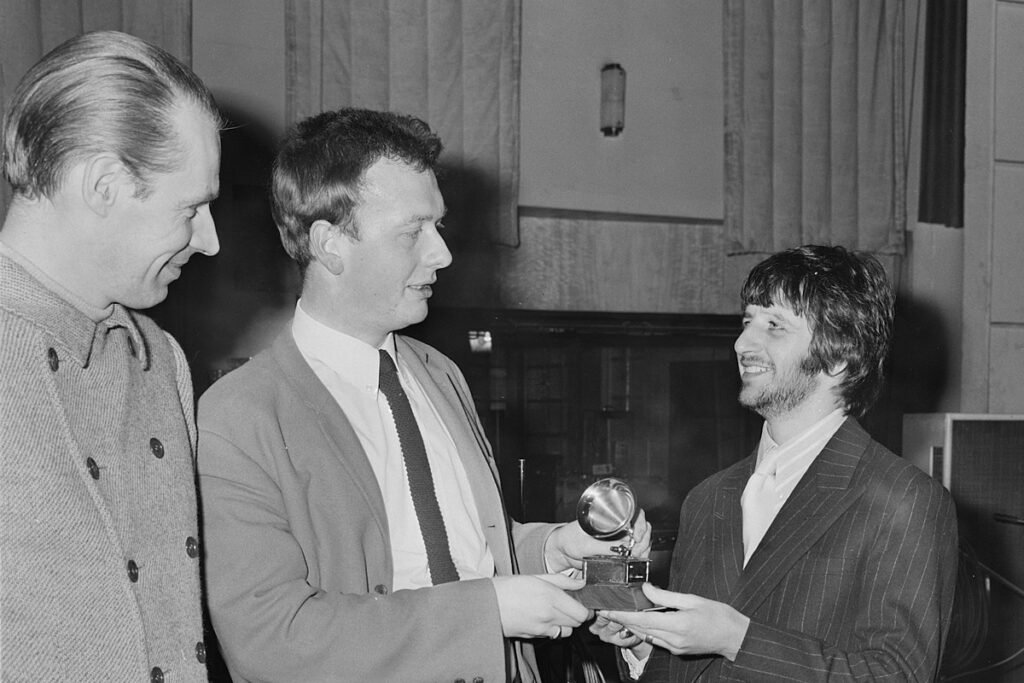
The Beatles’ success was not just a commercial phenomenon; they also received significant critical acclaim, amassing an array of prestigious awards that highlighted their artistic achievements. Throughout their career, they won a total of seven Grammy Awards, and were nominated for 23. The Grammy recognition began in 1965 when they won the Best New Artist and Best Performance by a Vocal Group for “A Hard Day’s Night.” These early awards underscored their immediate impact on the music scene.
Their 1967 masterpiece, Sgt. Pepper’s Lonely Hearts Club Band, brought them four Grammy Awards in 1968, including Album of the Year, making it the first rock album to receive this prestigious accolade. This recognition was a testament to the album’s groundbreaking production and innovative sound. The album also won Best Contemporary Album and Best Engineered Recording, Non-Classical, further cementing its status in music history.
Brit Awards and Ivor Novello Awards
In the United Kingdom, The Beatles’ contributions were equally celebrated. They received multiple Ivor Novello Awards, which are awarded for songwriting and composing merits. Their track “She Loves You” won the Ivor Novello Award for the Highest Certified British Sales of any Single issued in 1963. Overall, their career included winning the Ivor Novello for ‘Outstanding Contribution to British Music’ and ‘Best British Song Musically and Lyrically’ in subsequent years.
The Beatles were also honored posthumously at the Brit Awards; in 1977, they received the award for Best British Group, recognizing their profound impact on British music and their enduring popularity even after their breakup.
Critical Reception and Legacy
The critical accolades extended beyond awards. Albums such as Revolver and Abbey Road were not only commercial successes but also critically praised for their innovative recording techniques and musical depth. Abbey Road, released in 1969, was particularly noted for its second side medley, which has been hailed as one of the greatest musical pieces in rock history.
Moreover, their influence was recognized by Rolling Stone magazine, with Sgt. Pepper’s Lonely Hearts Club Band being ranked first on its list of the 500 greatest albums of all time in 2003. This honor speaks volumes about the album’s impact on music and its standing among critics and musicians alike.
Awards for Cultural Impact
The Beatles’ influence was also marked by various other honors that recognized their broader cultural impact. They were inducted into the Rock and Roll Hall of Fame in 1988, an acknowledgment of their fundamental role in shaping the landscape of modern music. Each member was also individually inducted in subsequent years, highlighting their personal contributions to the band and their solo careers.
These awards and recognitions are mere symbols of The Beatles’ immense impact on music and culture globally, illustrating a legacy that continues to influence new generations of artists and music enthusiasts around the world.
Global Influence and Honorary Titles
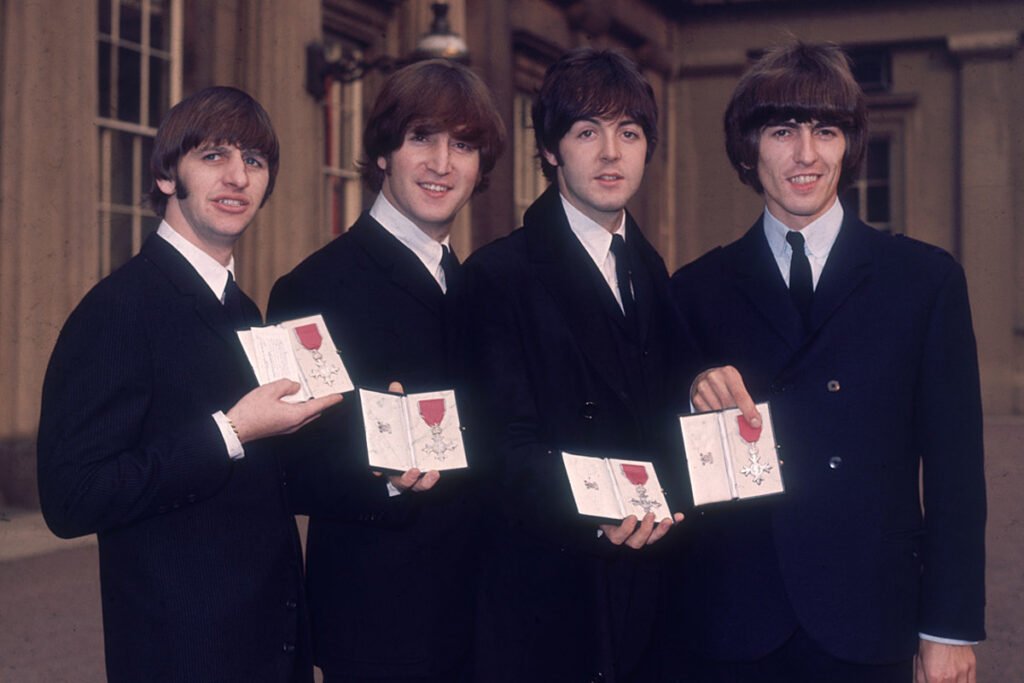
The Beatles’ impact on music transcends geographic and generational boundaries, influencing countless artists and bands from different genres and eras. Their innovative approach to music, from complex harmonies and unconventional recording techniques to pioneering the concept album, set a new standard in the industry. Bands like The Beach Boys, The Rolling Stones, and later generations of musicians, including Oasis and Radiohead, have cited The Beatles as a major influence on their work.
Their songwriting partnership, particularly that of Lennon-McCartney, has been a blueprint for musical collaborations, demonstrating the power of combining lyrical depth with melodic genius. This influence is evident in the widespread adoption of their music techniques, from the pop balladry of Elton John to the more modern pop acts like Ed Sheeran.
Honorary Titles and Distinctions
The global esteem for The Beatles was also recognized through various honorary titles and awards bestowed by governments and prestigious organizations. Perhaps most notably, in 1965, all four members of the band were appointed Members of the Order of the British Empire (MBE) by Queen Elizabeth II. This honor was particularly significant given the rarity of such recognitions for pop musicians at the time, signaling a cultural shift and acceptance of pop music within the traditional British honors system.
Beyond their home country, The Beatles’ influence was acknowledged by their inclusion in the French Ordre des Arts et des Lettres in 1996, recognizing their significant contribution to the arts. Although awarded posthumously, this honor underscored the lasting global cultural footprint of their music and its resonance with the ideals of artistic excellence.
Institutional Recognitions
In addition to governmental honors, The Beatles have been recognized by numerous institutions for their contributions to music and culture. They were inducted into the Rock and Roll Hall of Fame in 1988, an acknowledgment from the music industry of their groundbreaking role in the history of rock music. Their influence was further commemorated in various halls of fame around the world, including the UK Music Hall of Fame in 2004.
These recognitions, both as a group and individually, highlight the extraordinary impact The Beatles have had not only on music but also on global culture. Their legacy continues to be a source of inspiration and study, reflecting their unparalleled contribution to the world of music and beyond.
Philanthropy and Social Influence

The Beatles were not just musical innovators; they also used their immense popularity to influence social change and champion various causes. Throughout their career, they were vocal supporters of peace and anti-war movements, most notably evidenced during the Vietnam War era. Their advocacy for peace was symbolized in songs like “Give Peace a Chance” and “Revolution,” which became anthems for anti-war protests across the globe.
Benefit Concerts and Charity
The Beatles also actively participated in benefit concerts and charity efforts, using their platform to raise awareness and funds for those in need. One of the most significant of these was the Concert for Bangladesh in 1971, organized by George Harrison and Ravi Shankar. Although technically a post-Beatles event, it was a pioneering effort in the realm of benefit concerts, setting a precedent for future charity events in the music industry. The concert raised significant funds for refugees from East Pakistan (now Bangladesh) following the Bangladesh Liberation War and highlighted the potential for artists to mobilize support for global issues.
Additionally, their 1965 Christmas show in London was in aid of charities such as Oxfam, UNICEF, and the Red Cross, demonstrating their early commitment to philanthropic causes.
Influence on Public Opinion and Cultural Shifts
The Beatles’ public stances on various issues also had a significant impact on their fans and broader public opinion. Their outspoken views on topics ranging from the Vietnam War to civil rights influenced the attitudes of their young audience and contributed to wider cultural shifts during the 1960s and beyond.
Their refusal to perform in segregated venues during their American tours in 1964 and 1966 played a role in challenging racial segregation in the music industry. This action by such a prominent group was a strong statement against racial inequality and contributed to the ongoing civil rights movement in the United States.
Legacy of Activism
The Beatles’ involvement in social causes and their ability to use their platform for advocacy left a lasting legacy that has inspired subsequent generations of musicians to engage in social and political activism. Their example showed how artists could play a significant role in addressing global issues and shaping societal values, extending their influence far beyond music.
Legacy and Post-Breakup Achievements
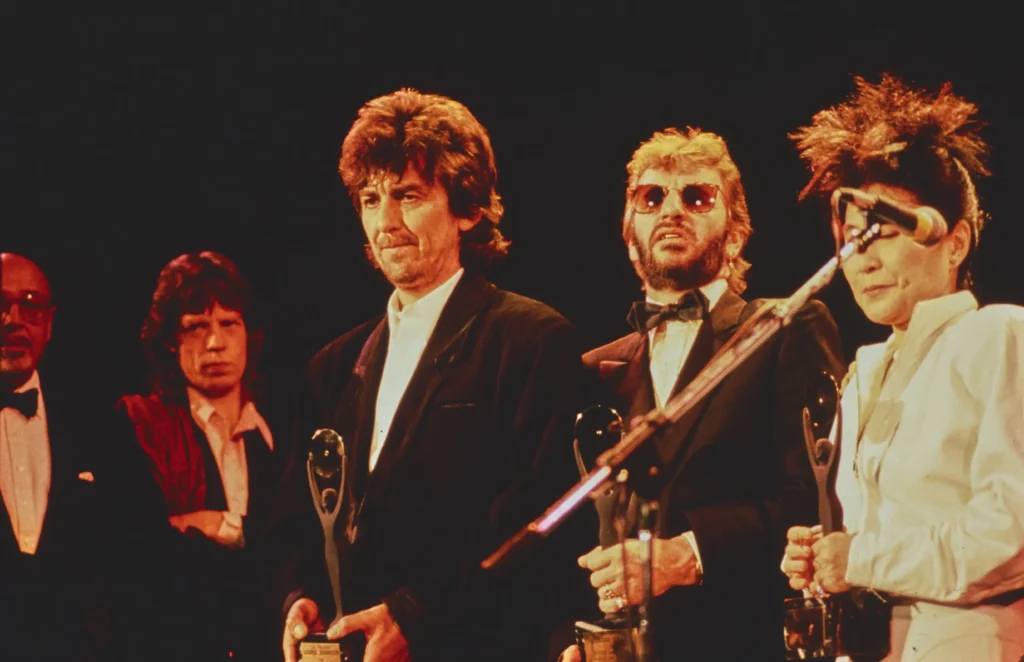
The legacy of The Beatles did not end with their breakup in 1970; rather, it has continued to evolve and resonate through subsequent decades. Post-breakup, The Beatles have continued to receive numerous accolades that affirm their lasting impact on music and culture. Notably, they were collectively inducted into the Rock and Roll Hall of Fame in 1988, with each member also receiving individual inductions later on. These honors underscore their foundational contributions to music both as a band and through their influential solo careers.
The Beatles have also been celebrated with multiple reissues of their music, including remastered versions of their albums and compilations like The Beatles Anthology series, which were released in the mid-1990s. These collections, featuring previously unreleased tracks, interviews, and studio outtakes, have been met with great commercial success and critical acclaim, introducing their music to new generations.
Influence on Future Generations
The Beatles’ influence on future generations of musicians and artists is profound and far-reaching. Bands and artists across various genres—from rock and pop to hip-hop and electronic music—cite The Beatles as a major influence in their work. Their innovative songwriting, recording techniques, and use of the studio as an instrument have become foundational elements in modern music production.
Their cultural impact extends beyond music, influencing fashion, film, and even literature, with countless works referencing or inspired by The Beatles and their music. Their story has been the subject of numerous documentaries and movies, further cementing their status as cultural icons.
Continued Recognition and Celebrations
The Beatles’ influence is also marked by ongoing public and media recognition. Major anniversaries of their albums and historical moments are celebrated around the world with fan gatherings, special broadcasts, and publications. Cities like Liverpool and Hamburg host festivals and events that attract thousands of visitors, eager to explore The Beatles’ roots and impact.
In addition to these celebrations, The Beatles have been commemorated with various forms of recognition, such as commemorative stamps issued by the Royal Mail and a dedicated museum, The Beatles Story in Liverpool. Furthermore, the crossing at Abbey Road remains a global landmark, perpetually drawing fans who recreate the famous album cover.
Educational Impact
The Beatles’ work is studied in academic settings, from music theory to cultural studies, reflecting their importance in understanding the social and cultural dynamics of the 20th century. Universities and scholars continue to explore their music, lyrics, and historical significance, ensuring that their legacy is not only preserved but also critically examined.
In summary, The Beatles’ legacy is a tapestry of continued musical influence, cultural significance, and global recognition. Their achievements in their post-breakup era are not merely a continuation of their past success but a dynamic legacy that continues to evolve, touching the lives of millions around the world.
